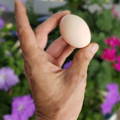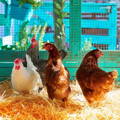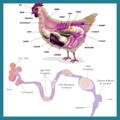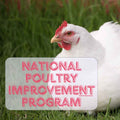
Egg Bound Hens: Causes, Symptoms & Treatment
Discover the causes, symptoms, and treatments for egg binding in chickens. Learn to recognize signs, apply practical home remedies, and know when to seek veterinary help. Ensure your flock's well-being by understanding risks and preventive measures.
Left unresolved, an egg bound hen is in a critical life-threatening emergency.
Subscribe
To join our mailing list and never miss an update!
Egg-binding in chickens is an emergency condition. When a hen encounters difficulty laying eggs, often due to an egg becoming lodged in the reproductive tract this can be fatal. This issue can lead to discomfort, illness, and even mortality if not addressed promptly.

Recognizing the signs of egg-binding and taking swift action is essential to ensure the well-being of the affected chicken. In this guide, we will explore the common symptoms of egg-binding and provide practical steps to help alleviate the condition at home.
An egg-bound chicken is unable to lay eggs due to an egg becoming stuck in the reproductive tract. This can be a serious issue that requires prompt attention, as it may lead to discomfort, illness, or even death if not addressed.
causes
Egg binding in hens can be caused by various factors, and it often results from difficulties in the egg-laying process. Here are some common causes:
1. Age-related Issues
Older hens may experience a decline in muscle tone in the reproductive tract, making it more challenging for them to lay eggs.
2. Genetics
Some breeds of chickens may be more prone to egg binding due to genetic factors. Breeds that are known for prolific egg-laying, like Leghorns or commercial hybrid layers, may face more stress on their reproductive systems, potentially increasing the risk of issues such as egg binding.

3. Obesity
Overweight hens may have difficulty passing eggs due to excess body fat putting pressure on the reproductive organs.
4. Nutritional Imbalances
Inadequate levels of calcium in the diet can lead to weak eggshells or difficulty in forming them, contributing to egg binding.
5. Dehydration
Lack of proper hydration can result in dry and hard eggshells, making them difficult to pass.

6. Environmental Stress
Stressful conditions, such as changes in the environment, disturbances, or the presence of predators, can lead to egg binding.
7. Infections or Diseases
Reproductive tract infections or diseases affecting the hen's overall health may contribute to egg binding.
8. Inactivity or Lack of Exercise
Hens that are not physically active may experience reduced muscle tone, affecting their ability to lay eggs.
9. Egg Size
Occasionally, unusually large eggs may be difficult for the hen to pass, leading to egg binding.
It's crucial to monitor the health of your chickens, provide a balanced and nutritious diet, and ensure they have access to clean water. If you suspect that a hen is egg-bound, prompt intervention is necessary to avoid complications. Consulting with a veterinarian experienced in poultry health is advisable for a proper diagnosis and appropriate treatment.
symptoms
1. Lethargy
The chicken may appear weak or lethargic.
2. Straining
Continuous straining or abdominal pushing without laying an egg.
3. Swollen Abdomen
The abdomen may appear swollen or distended. You should be able to actually feel the egg when you palpitate with your fingers.
4. Disinterest in Food
A decrease in appetite or disinterest in food.
5. Posturing
The hen may appear squatted and puffed out. She may have her mouth open and be breathing heavily.

Trending Articles
treatment
To help cure egg-binding in chickens, you can try the following steps. If you are unable to successfully resolve the bound egg, veterinary treatment may be necessary.

If these home remedies do not resolve the issue, it's crucial to seek veterinary assistance. A veterinarian experienced in poultry health can provide more advanced treatments, such as manually removing the egg or administering medication.
It's important to note that egg-binding can be caused by various factors, including nutritional imbalances, age-related issues, or underlying health problems. Preventive measures, such as providing a well-balanced diet and monitoring the health of your chickens, can help reduce the risk of egg-binding.
In conclusion, understanding and addressing egg-binding in chickens is vital for the overall health of your flock. Prompt recognition of symptoms and the application of appropriate home remedies can often alleviate the condition. Nevertheless, the severity of cases may vary, and veterinary intervention may be necessary for a more comprehensive approach.
Implementing preventive measures, such as ensuring a balanced diet and monitoring the health of your chickens, can contribute to reducing the risk of egg-binding and promoting the well-being of your feathered companions.
Trending Products
Copyright©2024 All rights reserved. We love to have you share our article as long as you include a direct link to this page. This article or any portion thereof , including all images, may not be reproduced or used in any manner whatsoever without the express written permission of Gypsy Shoals Farm.



